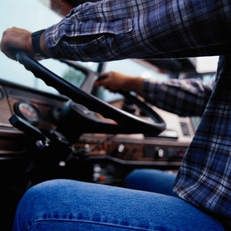
Generally, under the going and coming rule, an employee going to or coming from work is considered outside of the scope of employment, so that the employer is not liable for any wrongful acts committed by that employee during that time. However, an exception to the going and coming rule occurs when an employee commits a negligent act while engaged in a "special errand" or a "business errand" for the benefit of his employer while commuting. (Ducey v Argo Sales Co. (1979). If the employee is not simply on his way from his home to his normal place of work or returning from said place to his home for his own purpose, but is coming from his home or returning to it on a special errand either as part of his regular duties or upon a specific, even one time request of his employer, the employee is considered to be in the scope of his employment from the time he starts on the errand until he has returned or until he completely abandons it and resumes his personal affairs.
Thus, when you, the employer, ask your employee to drive somewhere on their way home from the office or on their way to the office, and that employee, for instance, gets into a car accident which is found to be his fault, then your business may be liable for any injuries and damages caused by that employee. As the law provides, the liability can only be imposed for incidents that occur before and not after the errand is completed.
While it's clear that the risk of liability ends when the employee completes the task at the end of the work day and continues to travel home, it's not so clear when that risk ends, if at all, if the employee completes the task while on his way to work, and upon completion of the errand continues to travel to his normal worksite. On one hand, an argument can be made that the employer should not be liable for any incident after the errand is completed and before the employee arrives to his normal workplace because this would otherwise be a normal part of the "coming and going time". On the other hand, it can also be argued that the employee started his workday from the moment he started working on the errand and until the end of that workday. I anticipated that future cases will provide some clarity for this type of tricky situation.
For now, if you want to avoid any risk of liability for any accidents caused by your employees on their way to or from work, simply avoid asking them to run any errands. This includes such simple things as picking up supplies, dropping off packages, etc.
Thus, when you, the employer, ask your employee to drive somewhere on their way home from the office or on their way to the office, and that employee, for instance, gets into a car accident which is found to be his fault, then your business may be liable for any injuries and damages caused by that employee. As the law provides, the liability can only be imposed for incidents that occur before and not after the errand is completed.
While it's clear that the risk of liability ends when the employee completes the task at the end of the work day and continues to travel home, it's not so clear when that risk ends, if at all, if the employee completes the task while on his way to work, and upon completion of the errand continues to travel to his normal worksite. On one hand, an argument can be made that the employer should not be liable for any incident after the errand is completed and before the employee arrives to his normal workplace because this would otherwise be a normal part of the "coming and going time". On the other hand, it can also be argued that the employee started his workday from the moment he started working on the errand and until the end of that workday. I anticipated that future cases will provide some clarity for this type of tricky situation.
For now, if you want to avoid any risk of liability for any accidents caused by your employees on their way to or from work, simply avoid asking them to run any errands. This includes such simple things as picking up supplies, dropping off packages, etc.
 RSS Feed
RSS Feed